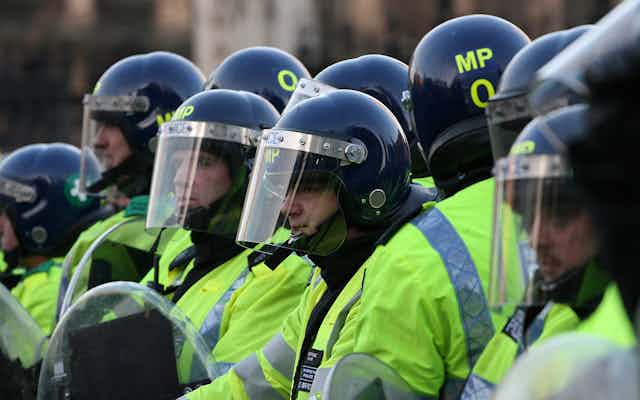Britain recently elected Police and Crime Commissioners for only the second time, and while they have not met with universal acclaim since their introduction, they have made some aspects of police governance more visible. But whether the changes they’ve brought to the governance of Britain’s police forces should be welcomed remains moot: mere elections should not be mistaken for democratic accountability.
While the power of PCCs to hire and fire chief constables has introduced a previously uncommon level of deference among that select group of police chiefs, it’s business as usual in many ways. The problem is that “business as usual” over many decades – as made painfully clear in the details from the Hillsborough disaster inquest – is littered with examples where police conduct and attitudes have appeared incompatible with democratic values. While these inquests were first and foremost about justice for the 96 that died and their families, it poses unanswered questions concerning the actions of the police, and the ability of society to control them.
The officers who failed to protect fans at Hillsborough and lied for 27 years to cover up that failure showed utter contempt for the principle that police should be accountable to the law. Powerful individuals and institutions were willing and able to pursue their own agendas through deceit, leading even to the crude stereotyping of an entire city.
Hillsborough is very far from being an isolated example, and there are other examples of very poor police conduct which seem to have been carried out with the approval and encouragement of elected government officials. There have been calls for a full inquiry into the so-called Battle of Orgreave during the 1984 miners’ strike, and suddenly the intensely political policing of 1970s and 1980s Britain is back under the spotlight.
What’s really changed?
It will be said the police today are more professional, more committed to cooperating with and listening to the views of diverse communities, and more willing to facilitate peaceful protests. The official line remains that the police are steadfastly apolitical and impartial in how they use their powers. Of course it would be wrong to ignore the genuine efforts to root out overt prejudice and punish wrongful conduct. But ultimately the basic assumptions according to which the police operate have not changed very much.
The right to use legitimate force places the police in a unique position, enabling them to take “decisive action” to cope with emergencies. Most police work is generated by calls from the public. Police are able to intervene more quickly than other services and, if necessary, to impose solutions in situations of conflict or danger. This is valued as a safeguard by many people: we know we can call on the police to take control when we are unable to do so for ourselves.
However the society we live in is neither homogeneous nor equal. There are at least two sides to every story. The police cannot attend every incident nor patrol every community all of the time. And many of the most widespread and serious harms in our society are not inflicted by a single, identifiable “offender”. The type of social protection offered by the police can only ever be partial, and is often selective. Ultimately the police exercise control over the conduct of certain individuals and groups in order to protect the interests of others.

For example, in a notable recent case a Merseyside police officer was dismissed for gross misconduct after failing to assist a Tesco security guard who was wrestling with a shoplifter. The thief was later convicted of stealing a bottle of whisky worth £4.62. This case underlined the clear expectation that the police should use their resources to protect the interests of supermarkets and support their business model. In 2015, the police recorded 333,671 offences of shoplifting.
Police forces have also expended significant sums to protect companies involved in fracking from protesters. Meanwhile major cutbacks to health and safety inspection and enforcement regimes mean that regulations designed to ensure businesses keep their employees and the public safe can be more easily flouted. The HMRC’s failure to stringently enforce tax demands against large multinationals is in striking contrast to the police’s treatment of UK Uncut protestors attempting to draw attention to this issue. These differences in approach should make us question who is being protected by policing today, and whether the emphasis on the work of uniformed police deflects attention from other types of policing that may be more fundamental to democratic society.
The power of the boys in blue
The police have an enduring symbolic power that places them at the centre of discussions of safety and security. The image of the police as the true crime-fighters is projected in the speeches of home secretaries, and the introduction of PCCs, seems only to have helped reinforce this crime-fighting narrative. When new details of police excess or abuses ignite a more far-reaching debate, this crime-fighting mythology douses the flames. Crime is bad, the police fight crime, therefore the police are good.
Crime, though, is an ill-defined and malleable category of conduct, and the process of criminalisation relies on human judgement. Policing is not and never can be a sanitised environment free of politics. The use of police resources is driven and guided by political aims; policing is inherently political in nature. So concerns about PCCs politicising policing should never have been our primary concern. Instead we should worry that this new approach to ensuring the police are well-governed appears to sustain the status quo, while deflecting attention from a much more fundamental set of questions about the role of the police in a democratic society.

